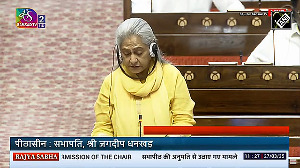F&O trading is a zero-sum game where one person's loss is another's gain.
Only one per cent of traders gained the money lost by 93 per cent, warns Harsh Roongta.

Housing societies' gatherings in the 1980s often featured food stalls and light gambling games.
One popular game was 'Lucky 7', played with two dice. Players bet on whether the total would be 'below 7', 'above 7', or 'exactly 7'.
A Rs 10 bet on 'below 7' or 'above 7' could win you Rs 20, while betting on 'lucky 7' could win you Rs 40. Most people bet randomly for fun, winning occasionally. But eventually most lost and quit.
I thought I had devised a clever strategy: Doubling my stake after each loss to recover my original bet. I started by betting Rs 10 on 'above 7' and lost.
I doubled to Rs 20 on the same outcome and lost again. Then, I bet Rs 40 and won, leaving me Rs 10 ahead.
I repeated this process until three consecutive losses forced me to double my stake to Rs 80.
The stall owner informed me that the maximum stake allowed was Rs 40. My strategy failed due to this limit.
The loss spurred me to consult Madhav, a statistics expert, to understand the game's odds. He explained that the two dice can produce 36 possible outcomes, ranging from 2 to 12.
Of these 15 could be below 7, 15 above 7, and six exactly 7. Therefore, the probability of 'below 7' or 'above 7' is 42 per cent each, and the probability of 'lucky 7' is 16 per cent.
Betting on 'above 7' carried a 42 per cent chance of winning Rs 10 and a 58 per cent chance of losing Rs 10, resulting in a probable loss of Rs 1.60 per round.
If each round had a negative probable payout, I could only compound my chance of a loss by doubling my bets after each loss.
The Martingale strategy I had adopted, which involves doubling stakes after each loss, can lead to slim pickings if three conditions are met: no stake limits, infinite funds to double the stakes after each loss, and an iron discipline to stick to the strategy even as the stakes grow.
I recalled this while reading the Securities and Exchange Board of India's report on the Rs 182,000 crore losses suffered by 93 per cent of investors trading in the futures and options (F&O) segment.
F&O trading is a zero-sum game where one person's loss is another's gain. Only one per cent of traders gained the money lost by 93 per cent. Brokers and stock exchanges profited from every transaction.
Unlike 'Lucky 7', F&O trading isn't purely based on chance. Factors like time decay, margin trading, market sentiment, and volatility all play a role.
The final 30 minutes before contract expiry accounts for most of the trading volume and also for the profits or losses.
Success requires understanding these factors and deploying fast automated algorithms that can execute trades in nanoseconds.
Even then, not every trade will be profitable. But repeated enough times with appropriate stakes, such strategies can yield positive outcomes.
The one per cent elite traders have vast resources and deploy complex strategies to stay on top, which they never share with retail traders for their small fee.
Most of the 93 per cent who lose rely on half-baked strategies, like my stake-doubling approach, or rented strategies from brokers interested in boosting transaction volumes.
Using such strategies is a sure way to lose money in F&O trading.
Truth be told, the elite one per cent acts as a magnet for the 93 per cent of losers, who continue to lose money in their pursuit of elite status.
Their failure only reinforces the maxim that F&O trading is no way to make easy money, only a sophisticated way to lose money.
Sebi's research report conveys the same message in a more prosaic fashion. Ignore it at your peril.
Harsh Roongta heads Fee-Only Investment Advisors LLP, a Sebi-registered investment advisor.
Disclaimer: This article is meant for information purposes only. This article and information do not constitute a distribution, an endorsement, an investment advice, an offer to buy or sell or the solicitation of an offer to buy or sell any securities/schemes or any other financial products/investment products mentioned in this article to influence the opinion or behaviour of the investors/recipients.
Any use of the information/any investment and investment related decisions of the investors/recipients are at their sole discretion and risk. Any advice herein is made on a general basis and does not take into account the specific investment objectives of the specific person or group of persons. Opinions expressed herein are subject to change without notice.
Feature Presentation: Aslam Hunani/Rediff.com











 © 2025
© 2025